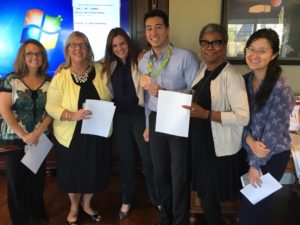Dear Reader,
You came to our hospital as a patient, in need of help. Thank you for that profound act of trust.
Now we come to you, humbly, to ask for your help in turn. The cause for excellent health care, here in our community, needs you. Will you consider becoming its champion … by making a gift?
WELL, WOULD YOU consider it? Would the opening paragraph of this one page, two-sided letter — personalized and signed by a hospital vice president — compel you to donate to a hospital that had cared for you or someone in your family?
The answer, for about 35,000 recipients, was yes. Over 10 years, that is the number of people who have responded with donations to this letter, which is tweaked and sent annually to former patients of the Sharp HealthCare system’s four main and three specialty hospitals in San Diego. The donations have ranged from $1 to $20,000.
Ten thousand of those responses were from new donors — an often hard-to-convince audience during any fund-raiser.
“It just goes to show you that an effective, well-crafted appeal can make a tremendous difference,” said James Sardina, the annual giving manager for the Sharp HealthCare Foundation.
Tom Ahern, the author of the letter, is one of the country’s most sought-after creators of fund-raising messages. He cites this piece as an example of how the language of giving — the right words, articulating the right appeal aimed at the right audience — can increase response rates.
“You have got to make your donors feel good in order to retain them,” said Mr. Ahern, who is based in Foster, R.I.
All good advertising copywriters know the power of the word “you” to generate a sense of immediacy and connection; Mr. Ahern used it in each of the first five sentences. But in explaining the success of this letter, he also cited the principle of reciprocity — meaning, in essence, we (the hospital) did something good for you (the reader and former patient). So perhaps, the letter suggests, you can do something good for us.
After all, it’s only fair, right? People like to think of themselves as being fair. Indeed, that is one of the nine moral adjectives that the psychologist Jennifer Shang has identified in her research on what motivates people to give. These “describe a core sense of who people actually are, as well as a core sense of who people would ideally like to be,” said Dr. Shang, a professor of philanthropic psychology at Plymouth University in Britain.

The other eight adjectives are kind, compassionate, helpful, caring, friendly, generous, honest and hard-working.
In one study, Dr. Shang found that thanking those who contributed to a public radio station in the United States for being “kind and compassionate” increased giving among female donors by 10 percent.
That said, she added, successful fund-raising is complex. “Randomly injecting these words into the same communication that donors would not otherwise read anyway does not help anybody,” she said in an email. “It is about allowing the donors the opportunity to reflect on who they think they are.”
Yet many charitable organizations “churn out appeals that talk about how fabulous their organizations are and not about the donor’s part of the story,” said Jen Love, co-founder of the fund-raising consultancy Agents of Good. Making appeals more donor-centric, Ms. Love said, is the hallmark of effective fund-raising.
She and Mr. Ahern said the most effective medium to reach donors was one from the past: old-fashioned direct mail.
Older people, belonging to a generation that still prefers print, are the most generous: A 2013 study on generational giving habits commissioned by the software company Blackbaud found that those born in 1945 and earlier tend to give an average of $1,367 a year, surpassing millennials, who average $481 a year.
Because so much messaging has moved online, it’s not only older adults who are attracted by the novelty of delivered mail. “When you get something in your actual mailbox, that’s a thing!” said Ms. Love, whose firm is based in Waterdown, Ontario. “You think it might be an invitation to a wedding or a party.”
Of course, a good fund-raising appeal is just that: an invitation to help an organization that makes donors feel good about doing it, while communicating the urgency of the need.
“We try to get our clients to imagine that it’s 24 hours before your organization was founded,” said Ms. Love, whose clients include Habitat for Humanity, the Y.M.C.A. and Humber College in Toronto. “A group of people stood together that day and said, ‘We have to do something about this.’ Every single appeal now has to resonate with that same core value, that same ‘fist on the table’ insistence and energetic urgency.”
Urgency, and as Mr. Ahern said, the need to “celebrate how wonderful the donor is,” as he did in the windup of his letter for Sharp’s Chula Vista hospital, which is being mailed again in 2017, illustrate how the language of giving can have a huge effect.
“We cannot do great medicine without your help. So please consider Sharp Chula Vista in your decisions about charitable giving.
I know there are many good charities that will seek your help. Please know how honored we are when you choose to make a gift to Sharp HealthCare Foundation.”
